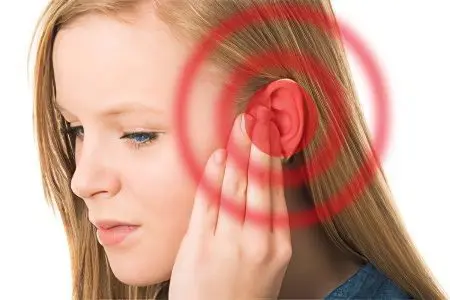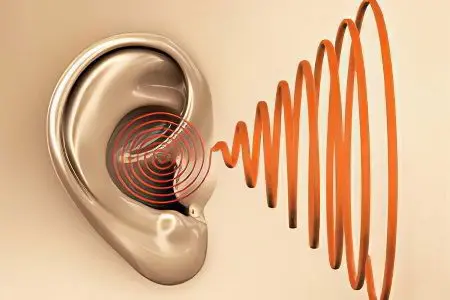
Tinnitus is the perception of sounds that are actually absent, that is, a person hears certain noise interference, but there are no auditory stimuli. Noise can occur both in one organ of hearing, and in both, sometimes there is a feeling that the noise is not in the external environment, but inside the head.
Tinnitus is an unfamiliar word that medical professionals use to refer to ringing and tinnitus. The patient may indicate that he hears buzzing, humming and other sound stimuli, although in fact they will be absent. Such a phenomenon as tinnitus often occurs with a hearing loss. At the same time, the noise strength is not a constant unit, the sound can either increase or decrease. In old age, tinnitus tends to get progressively worse. This may be due to the natural aging of the body, the development of hearing aid pathologies, vascular diseases that affect the normal blood supply to the ear, and more. In any case, something will make it difficult for the human ear to perceive the actual sounds of the environment.
Noise in the ears cannot be called an independent disease, it is only a manifestation of a particular pathology. This symptom should not be ignored; if unusual auditory sensations appear, it is necessary to consult a doctor and find out the cause of their occurrence. It is known that chronic tinnitus haunts from 5 to 10% of the people inhabiting the planet. Moreover, older people are most often affected by tinnitus.
The mechanism of development of tinnitus

Sound in the inner ear is perceived by hearing cells with hairs. They convert the noise coming from the external environment into electrical impulses, which are then transmitted to the brain. If all systems are working properly, then the movements of these hairs will reflect the vibrations of sounds.
When the hairs move in a chaotic pattern, the human brain receives a mixture of electrical signals that it recognizes as constant noise.
Why does tinnitus appear? What are the reasons?
The causes of tinnitus are shown in the table:
Why does tinnitus occur? | What does a person hear at this time? |
Pathological decrease in the diameter of the vessels of the brain, a violation of its blood supply. A similar situation is observed with atherosclerosis, dystonia of the vegetative-vascular system, with high blood pressure and osteochondrosis. | In this case, a person is haunted by a pulsating noise in the head, which is characterized by high intensity. It tends to increase during the period when blood pressure increases. |
Violations in the functioning of the auditory nerve in which there may be a failure at the stage of perception, transmission or generation of nerve impulses. The reasons may be as follows: head trauma, failure of cerebral circulation, inflammation with damage to the structures of the ear. | The person has hearing loss. At the same time, monotonous noises in the head begin to disturb. |
Disturbances in the work of the vestibular apparatus. In this case, a person will not be able to coordinate his movements, he will lose balance. | Most often, this situation is observed with a sharp movement of the position of the body. For example, with a rapid transition from a horizontal to a vertical position, which is accompanied by tinnitus. |
Narrowing of the vessels supplying the cervical spine. | The pathology of the cervical vertebrae leads to the formation of growths. They, in turn, put pressure on the blood vessels, which can cause tinnitus. |
Emotional upheavals, diseases of the nervous system, chronic fatigue syndrome. | Noise in the ears and in the head may appear against the background of mental instability. This is due to the fact that under stress, the susceptibility of the organ of hearing increases. |
The following disorders can lead to the occurrence of tinnitus:
| All of these causes can lead to the occurrence of pulsating tinnitus, as the blood supply to the brain suffers. |
Taking certain medications. | Tinnitus can occur due to the use of NSAIDs, antibiotics, antidepressants, heart drugs. Also, tinnitus may indicate intoxication of the body with drugs. This side effect develops when taking large doses of salicylates, quinine and diuretics. |
Aging of the body. | The older a person gets, the more the hearing organs wear out. In this case, the loss of hearing acuity can be accompanied by various noises: rattle, hum, squeak. |
Naturally, this is not a complete list of reasons that can cause tinnitus.
It can disturb a person with the following diseases and pathological conditions:
Deficiency of vitamins in the body.
Osteosclerosis.
Brain injury.
Pathology of the urinary system.
Osteochondrosis.
Diseases of the endocrine system that develop against the background of iodine deficiency.
Temporal bone injury.
Meniere’s disease.
Tumors of a benign nature that develop in the brain, for example, acoustic neuroma.
Neoplasms of the brain of malignant origin.
Postponed stroke.
Chronic or acute sensorineural hearing loss.
Diseases of the middle ear.
Low blood pressure.
Inflammation of the membranes of the brain of a viral or bacterial nature.
Diabetes.
Pathologies of the nervous system, for example, schizophrenia.
Vegeto-vascular dystonia.
[Video] Dr. Berg – What does tinnitus (tinnitus) mean, how to get rid of tinnitus?









